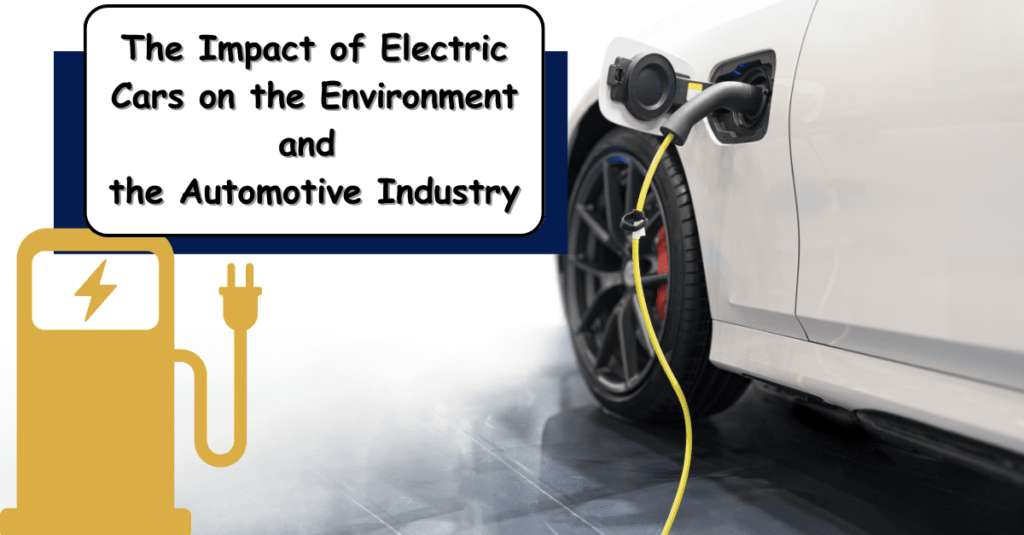Introduction
In recent years, there has been an increase in concern about the environmental impact of gasoline-powered vehicles, leading to the rise of electric automobiles as a viable answer. As a result, the automotive industry has undergone tremendous transition, with electric vehicles becoming more widespread. This blog aims to explore the impact of electric cars on the environment and the automotive industry.
The environmental impact of electric vehicles
One of the key reasons for the popularity of electric vehicles is their low environmental effect. Unlike gasoline-powered automobiles, electric vehicles create no emissions when in use. This is because electric vehicles utilize batteries rather than internal combustion engines, which burn fossil fuels and spew carbon dioxide into the atmosphere.
However, the environmental impact of electric vehicles is not totally beneficial. While electric cars produce no emissions while driving, they do require electricity to charge their batteries, and the generation of that electricity can result in greenhouse gas emissions. The magnitude of these emissions is determined by how the electricity is generated. The environmental effect of electric vehicles is considerably decreased if the electricity is generated from renewable sources such as wind or solar power. However, if the electricity is generated from coal or natural gas, the environmental impact of electric cars may be equivalent to that of gasoline-powered vehicles.
Another environmental issue with electric vehicles is the manufacture of their batteries. Battery manufacture necessitates the usage of rare earth metals, the extraction of which can be hazardous to the environment. The environmental impact of battery production, on the other hand, is often balanced by the environmental benefits of electric vehicles in terms of lower emissions.
The effect of electric vehicles on the automotive industry
Electric vehicle adoption has had a tremendous impact on the automotive industry, influencing everything from vehicle design to manufacturing methods.
Design of a vehicle- Vehicle design is one of the most noticeable effects of electric vehicles on the automobile industry. Electric automobiles necessitate different components than gasoline-powered vehicles, such as electric motors and batteries, resulting in a variety of vehicle designs and sizes. Electric vehicles, for example, can have a lower bonnet and a more aerodynamic shape to reduce wind resistance and boost range.
Manufacturing methodologies- Electric vehicles, like gasoline-powered automobiles, require various production techniques. Battery manufacturing, in particular, is a difficult and costly process that necessitates specialized equipment and facilities. This has resulted in the establishment of new battery manufacturing facilities as well as the conversion of existing manufacturing facilities to produce electric vehicle batteries.
The supply chain- The rise of electric vehicles has also had an effect on the automotive supply chain. Battery manufacture necessitates a consistent and secure supply of rare earth metals, which has boosted demand and competition for these minerals. As a result, new supply chains have emerged, as has the quest for alternative materials.
Marketing and sales- Electric vehicles have also had an impact on automobile sales and marketing. Electric vehicles are frequently marketed as ecologically beneficial and futuristic, appealing to people who care about the environment and want to be at the cutting edge of new technology. This has resulted in new marketing techniques and the creation of new sales channels for electric vehicles.
Conclusion
The popularity of electric vehicles has made a huge impact on the environment as well as the automotive industry. While electric vehicles have major environmental advantages over gasoline-powered vehicles, there are still issues concerning the manufacturing of their batteries and the source of the electricity used to charge them. With the rise of electric vehicles, the automotive industry has had to adjust, modifying vehicle design, manufacturing methods, supply chains, and sales and marketing techniques. The continuing development and adoption of electric vehicles is expected to affect the automobile industry’s future.
